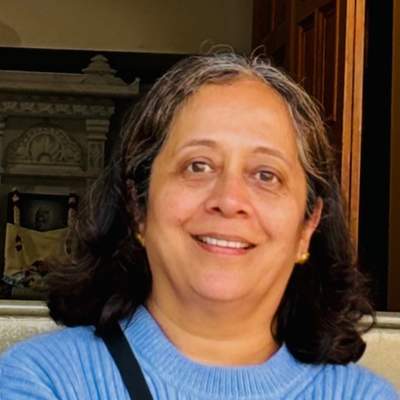Sanjana Brahmawar Mohan is Director at Basic Healthcare Services, a not-for-profit organization that provides a responsive, empathetic primary health ‘circle of care’ that is rooted in the community. BHS works in southern Rajasthan in India and serves tribal communities with high burden of malnutrition, morbidities, and preventable mortality. Sanjana is a paediatrician and epidemiologist who completed her studies from Rajasthan India, and University of London. In her experience of over 25 years, she has worked at tertiary care hospitals, anchored trainings for doctors and auxiliary nurse midwives, helped set up the National Child Health Resource Centre, and led community-based research focusing on health and nutrition.
Sanjana is a proud Alumnus of the India Leadership Journey (2022) curated by WomenLift Health. The Journey has helped strengthen the cause of motivation and leadership of women workforce in primary healthcare, something she holds very close to her heart.
LinkedIn: https://www.linkedin.com/in/sanjana-brahmawar-mohan-19ba16196/
All Sessions by Dr. Sanjana Mohan
Women on the Frontlines: An Undervalued and Unprotected Workforce
Led by: WomenLift Health.
Women are the backbone of every successful health workforce and health initiative. They make up 70% of the global workforce and 90% of frontline healthcare workers (HCWs), yet they are overburdened, underpaid, unsupported and unprotected in the workplace. According to the Community Health Impact Coalition, 50% community frontline workers in LMICs, and 86% in Africa, are not salaried. Country policies and frameworks on the incentive-based or volunteer labor of frontline workers are compounded by donor-funded primary care programs that support delivering healthcare through unpaid labor as an acceptable mechanism to enable access to care and achieve universal healthcare coverage, thus perpetuating forms of structural violence. In most LMIC’s there is no legal/policy framework specifically designed to protect frontline health workers. The leadership and power structures frontline HCWs report to are still predominantly male. According to the #HealthToo report by Women in Global Health, which analyzed women’s stories from 40 countries, women face blatant harassment and assault in the workplace. Failing to value, promote, pay or protect frontline workers impacts retention and quality of service delivery and ultimately negatively impacts the health system.
This panel brings together Alumnae from the Leadership Journey and women working on the issues of the frontline women workforce. The session will outline the current state of women on the frontlines in low-resource countries, with particular emphasis on Asia and Sub-Saharan Africa’s community health workforce. We will discuss the critical need to build leadership among women while simultaneously working to shift gender-based social perceptions and power dynamics and address issues of pay and protection. Panelists will share specific country examples which have been undertaken to understand and address these inequities, discuss challenges, and opportunities for donors, advocacy groups, and ministries of health to support a shift to a more empowered, safe, and fairly paid frontline workforce.
Moderator: Ms. Lanice C. Williams, Independent Consultant; Chair, Women in Global Health Washington, DC Chapter
Panelists
1. Samara Andrade - Vice President, Program Strategy and Partnerships, HCP CureBlindness/SightLife international
2. Dr. Sanjana Mohan, Director, Basic Healthcare Services
3. Dr. Choolwe Jacobs, Lead for Women in Global Health Zambia Chapter
4. Dr. Priya Nanda, Independent Consultant, Gender, SRHR, and Women’s Economic Empowerment

